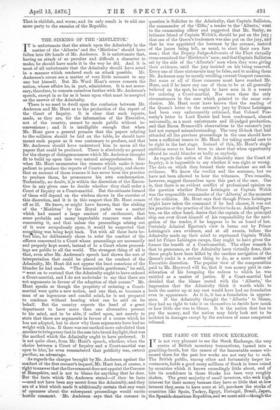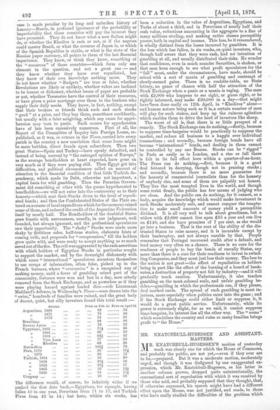THE PANIC ON THE STOCK EXCHANGE.
TT is not very pleasant to-see the Stock Exchange, the very- 1. centre of British monetary transactions, turned into a gambling-booth, but the causes of the lamentable scenes wit- nessed there for the past few weeks are not very far to seek. The British public, among other -and fortunately larger in- vestments, holds a good many millions of Stock in loans raised by countries which it knows exceedingly little about, and of late its confidence in those Stocks has been very roughly shaken. The great majority of small investorel who-seek high interest for their money because they have so little that atlbow interest they eem to have none at all, purchase the stocks of -countries like Spain, Turkey, Egypt, Portugal, Brazil,. Japan, the Spanish-American Republics, and we must add—though:the case is made peculiar by its long and unbroken history of honesty—Russia, in profound ignorance of the probability or improbability that those countries will pay the interest they have promised. They do not know what a new Sultan might do, or whether the Khedive is rash or not, or if the negroes could master Brazil, or what the revenue of Japan is, or which of the Spanish Republics is stable, or what is the state of the Russian paper currency, all points to them of the last financial importance. They know, or think they know, something of the " resources " of these countries—which form only one element in the question, and not a great one — and they know whether they have ever repudiated, but they know of their own knowledge nothing more. They do not know whether " Budgets " are true or false, whether Revolutions are likely or unlikely, whether rulers are inclined to be honest or dishonest, whether issues of paper are probable or not, whether Treasuries have the control of their resources, or have given a prior mortgage over them to the bankers who supply their daily needs. They know, in fact, nothing, except that their brokers or friends think such and such stocks " good " at a price, and they buy them, sometimes confidently, but usually with a faint misgiving, which any cause for appre- hension may turn to panic. Such causes for apprehension have of late been excessively numerous. First of all, the Report of the Committee of Inquiry into Foreign Loans, re- published, as it was, in extenso in the Times, carried into every parish in the country a new conviction that some loans might be mere bubbles, direct frauds upon subscribers. Then two great States—Spain and Turkey—have openly defaulted, and instead of being coerced by " the outraged opinion of Europe," as the average bondholders at heart expected, have gone on very much as if they were paying still. Then Egypt got into difficulties, and political circumstances called an amount of attention to the financial condition of that little Turkish de- pendency, which made its Debt, otherwise not important, a capital basis for wild gambling. Then the Peruvian Govern- ment did something or other with the guano hypothecated to bondholders—we will not enter into the controversy as to their honesty—which sent their Stocks down to the level of repudi- ated bonds ; and then the Confederated States of the Plate en- tered on a course of local expenditure which for the moment ruined some of them, and reduced the credit of the Argentine Federation itself by nearly half. The Bondholders of the doubtful States grew frantic with nervousness, usually, in our judgment, well founded, but always ignorant, and the professional speculators saw their opportunity. The " shaky" Stocks were made more shaky by fictitious sales, half-true stories, elaborate hints of coming evils, and proposals for " compromises," till the holders _grew quite wild, and were ready to accept anything as so much saved out of the fire. The evil was aggravated by the rash assertions with which holders of Egyptian Stocks in particular sought to support the market, and by the downright dishonesty with which some " international " speculators accustom themselves to use scraps of information, often false, picked up in the French bureaus, where " concussion" is a recognised way of making money, until a fever of gambling seized part of the community, fortunes were won and lost in a day, men utterly removed from the Stock Exchange, and as powerless as if they were playing hazard against loaded dice—vide Lieutenant Maitland's defence, in Wednesday's Times—were drawn into the " swim," hundreds of families were ruined, and the great body .of decent, quiet, but silly investors found this total result :—
STOOKS.
Price on Feb. 25. Price on April 12.
Argentines, 1866
... 82 56
IP 1871
... 78 46
11 1872
54 84 Brazilians
... 94 88
Buenos Ayres ...
•• • 79 52 Egyptians, 1862 ...
••• 44
,, 1864
... 86 50
„ 1868 ...
• • • 64 42 „ Vice. Loan
... 77 50
„ Khedive
• •• 63 38 Entre-Rios
• • • 100i 70 Peru, 1870 ...
• • • 35 18-1
1872 ...
26 15
Tur„ kish, 1854 ...
54 30
1858 ...
28 18
7, 1862
25 17
,, 1865 ...
26 1
PP 1869 ...
24 13 Uruguay ...
• • •
28 18
The difference would, of course, be infinitely wider if we puslied the first date back,—Egyptians, for example, having fallen 40 in one year, Peruvians from 71 to 17, and Turkish Fives from 43 to 14 ; but here, within six weeks, has been a reduction in the value of Argentines, Egyptians, and Turks of about a third, and in Peruvians of nearly half their cash value, reductions amounting in the aggregate to a fine of many millions sterling, and making entire classes perceptibly poorer, both in capital and income. This loss, be it remembered, is wholly distinct from the losses incurred by gamblers. It is the loss which has fallen, in six weeks, on quiet investors, who, though half aware that they were rash, had nci intention of gambling at all, and usually distributed their risks. No wonder that confidence, even in much sounder Securities, is shaken, or that men keen enough to see what profit speculators for the " fall " must, under the circumstances, have made, should be seized with a sort of mania of gambling and contempt of slowly-earned gains. There is no roulette-table, no State lottery, no game of chance with half the attraction of the Stock Exchange when a panic or a mania is raging. The man. with £2,000 who happens to see right, or guess right, or be rightly informed, may make £20,000 in a day—that might have 'been done easily on 12th April, in "Khedives" alone— and human nature being such as it is, a certain number of men will play for such stakes, and keep up the ruinous agitation which enables them to drive the herd of investors like sheep.
The worst of all is, that there is so little prospect of a remedy. The Stock Exchange can do nothing,—firstly, because to suppress time-bargains would be practically to suppress the market, and reduce all business to a haggle over individual transactions ; and secondly, because foreign bonds have all become " international " bonds, and dealing in them cannot be controlled by any one Bourse. Stocks can be " rigged" in Paris as easily as in London, and a rise or fall there is felt in its full effect here within a quarter-of-an-hour. The Press can do nothing,—first, because it is a good deal fettered in decrying, though not in praising stocks ; and secondly, because there is no more guarantee for the honesty of commercial journalists than for the honesty of anybody else, and some of them are palpably not honest. They live the most tempted lives in the world, and though some resist firmly, the public has few means of judging who are clean. And the public can do nothing, for it cannot, as a body, acquire the knowledge which would make investment in such Stocks moderately safe, and cannot conquer the tempta- tion to make small amounts of money yield a perceptible dividend. It is all very well to talk about greediness, but a widow with £2,000 cannot live upon £65 a year and can live on £140, and she buys promises of 7 per cent. as she would go into a business. That is the root of the ability of the dis- trusted States to raise money, and it is incurable except by their bankruptcy, and not always curable by that. ' People remember that Portugal recovered credit after a default, and lend money very often on a chance. There is no cure for the readiness of people to buy the bonds of rascally States, any more than there is a cure for their readiness to invest in swind- ling Companies, and they must just lose their money. The loss to the nation is not great—the effect of repudiation on holders being in part like the effect of the burning of a hoard of bank- notes, a destruction of property not felt by industry—and it will gradually teach caution. Unfortunately, it also teaches gambling on the most colossal scale, and unfair gambling be- sides,—gambling in which the professionals can, if they please, deal marked cards. The spread of such gambling is most in- jurious, more especially when politics enter into the game ; and if the Stock Exchange could either limit or suppress it, it would do a great public service. Unfortunately, while its power is extremely slight, for as we said, it cannot suppress time-bargains, its interest lies all the other way. The " scene " which scandalises the country and ruins so many families brings profit to " the House."



































 Previous page
Previous page